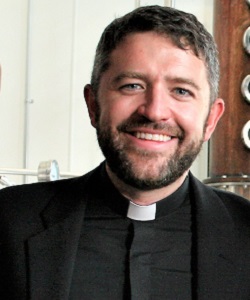
~Joseph Simmons, SJ
By Brian Harper
Other than being known as Pope Francis' religious order, the Society of Jesus is perhaps most famous for its schools. While some of this might be because Jesuit universities like Xavier and Gonzaga regularly churn out top-notch basketball teams, it is mainly the result of a distinct educational model that has prepared students to enter the world as "contemplatives in action" since the 1500s.
Joseph Simmons, SJ, a Midwest Jesuit scholastic, talked about the hallmarks of this education on April 25 at Jesuit Nation, an event the Midwest Jesuits host in Milwaukee, Wis. Speaking to a packed room of friends and alumni of Jesuit schools at Central Standard Craft Distillery, Simmons — who will be ordained a priest on June 3 — covered the five things he learned from his own Jesuit, Catholic education and time as a teacher at Jesuit schools.
"'The Greek word katholikos and Latin word universitas both drive at the concepts of 'wholeness' and 'oneness,' so 'Catholic university' is a redundant term," said Simmons. "Like 'delicious tacos.'" He suggested some of the best gifts Catholicism and the Jesuit charism have to offer can fully flourish in an educational setting.
The first he highlighted is intellectual curiosity, "the ability to say, 'I don't know,'" and the freedom to make mistakes. Celebrating his Jesuit and lay teachers' refusal to let him settle for a type of "whatever apathy," Simmons remembered the way his instructors helped convert his hatred of poetry and philosophy to a love for both. He also shared his appreciation for the diversity of opinions these teachers allowed.
"Unity does not equal uniformity of thought," he said, "To entertain different ideas doesn't mean you agree with them all. They say if you walk into a room full of five Jesuits, you'll get six different opinions."
Simmons also pointed out the spiritual depth Jesuit schools foster, in addition to their call for students to be religious, loving, and forgiving. Being religious, said Simmons, is about being reverent and attentive to reality.
"The spiritual life is only interested in the real," he said. "Moving from false self to true self, from false images of God to the true and living God."
| Click to see photos from Jesuit Nation. |
It also has to do with gratitude, which was of special importance to St. Ignatius, the Jesuits' founder. According to Loyola Press, Ignatius saw ingratitude as "the cause, beginning, and origin of all evils and sins."
While being thankful is easy when life is going well, said Simmons, it is possible to find gratitude even in life's toughest moments.
"When we take stock of all the blessings in life — even the challenges," he said, "we're moved to gratitude that we have made it thus far."
Jesuit schools are also committed to working for justice and developing "men and women for others," he said. Quoting his friend Brendan Busse, SJ, Simmons said, "The dirtiest word in Jesuit education is 'conversion.' If you graduate from one of our schools unconverted, we have failed you." While the call to seek justice inspired Simmons to enter the Jesuits and work with Jesuit Refugee Service, he called out other friends who have volunteered with the Jesuit Volunteer Corps, the Ignatian Spirituality Project, and other organizations.
"The work we do is not for ourselves — it's for the good of the world," he explained.
Drawing on another Jesuit concept, Simmons discussed cura personalis, or care of the whole person.
"We are spiritual beings in physical time and space," he said. "We are more than our minds, or our bodies, or our souls."
Given the Jesuits' focus on the magis — the Latin word for "more" that Jesuits frequently invoke to encourage people to seek the greater good — Simmons closed by inviting the Jesuit alumni gathered to seriously consider how they can take their faith tradition into the world wherever they are needed most.
Some students attending the event had the opportunity to reflect on this question immediately following Simmons's talk. A group of Marquette University students, who came to Jesuit Nation with their media writing class, absorbed insightful lessons they could put into practice in their own careers as journalists. Sophia Millay saw his remarks on intellectual curiosity as particularly relevant.
"I never want to limit myself when it comes to learning about different topics," she said. "I want to be the kind of writer that is constantly asking new and innovative questions and doing extensive research in order to make my writing unique."
Simmons said he sees his role as a Jesuit priest as serving members of the Church in their quest to grow in faith and pursue the magis.
"There is no me without you," he said. "You get to demand things of me that I don't get to ask. So storm your parishes. Don't settle for passivity in your life of faith!"
Watch Joseph Simmons, SJ, in a Midwest Jesuits Facebook Live conversation.
Read some of Joseph Simmons's writing at The Jesuit Post. To learn more about Jesuit Nation, contact Dan O'Brien, the Midwest Jesuits' regional director of advancement for Milwaukee and Omaha.
Learn about the stages of Jesuit formation and a vocation with the Jesuits.